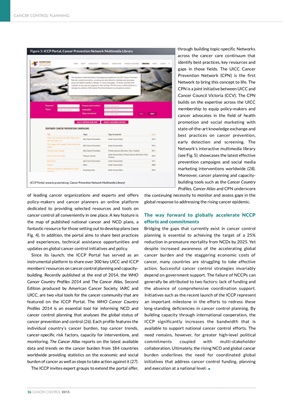
of leading cancer organizations and experts and offers
policy-makers and cancer planners an online platform
dedicated to providing selected resources and tools on
cancer control all conveniently in one place. A key feature is
the map of published national cancer and NCD plans, a
fantastic resource for those setting out to develop plans (see
Fig. 4). In addition, the portal aims to share best practices
and experiences, technical assistance opportunities and
updates on global cancer control initiatives and policy.
Since its launch, the ICCP Portal has served as an
instrumental platform to share over 300 key UICC and ICCP
members' resources on cancer control planning and capacitybuilding.
Recently published at the end of 2014, the WHO
Cancer Country Profiles 2014 and The Cancer Atlas, Second
Edition produced by American Cancer Society, IARC and
UICC, are two vital tools for the cancer community that are
featured on the ICCP Portal. The WHO Cancer Country
Profiles 2014 is an essential tool for informing NCD and
cancer control planning that analyses the global status of
cancer prevention and control (26). Each profile features the
individual country's cancer burden, top cancer trends,
cancer-specific risk factors, capacity for interventions, and
monitoring. The Cancer Atlas reports on the latest available
data and trends on the cancer burden from 184 countries
worldwide providing statistics on the economic and social
burden of cancer as well as steps to take action against it (27).
The ICCP invites expert groups to extend the portal offer,
through building topic-specific Networks
across the cancer care continuum that
identify best practices, key resources and
gaps in those fields. The UICC Cancer
Prevention Network (CPN) is the first
Network to bring this concept to life. The
CPN is a joint initiative between UICC and
Cancer Council Victoria (CCV). The CPN
builds on the expertise across the UICC
membership to equip policy-makers and
cancer advocates in the field of health
promotion and social marketing with
state-of-the-art knowledge exchange and
best practices on cancer prevention,
early detection and screening. The
Network's interactive multimedia library
(see Fig. 5) showcases the latest effective
prevention campaigns and social media
marketing interventions worldwide (28).
Moreover, cancer planning and capacitybuilding
tools such as the Cancer Country
Profiles, Cancer Atlas and CPN underscore
the continuing necessity to monitor and assess gaps in the
global response to addressing the rising cancer epidemic.
The way forward to globally accelerate NCCP
efforts and commitments
Bridging the gaps that currently exist in cancer control
planning is essential to achieving the target of a 25%
reduction in premature mortality from NCDs by 2025. Yet
despite increased awareness of the accelerating global
cancer burden and the staggering economic costs of
cancer, many countries are struggling to take effective
action. Successful cancer control strategies invariably
depend on government support. The failure of NCCPs can
generally be attributed to two factors: lack of funding and
the absence of comprehensive coordination support.
Initiatives such as the recent launch of the ICCP represent
an important milestone in the efforts to redress these
long-standing deficiencies in cancer control planning. By
building capacity through international cooperation, the
ICCP significantly increases the bandwidth that is
available to support national cancer control efforts. The
need remains, however, for greater high-level political
commitments coupled with multi-stakeholder
collaboration. Ultimately, the rising NCD and global cancer
burden underlines the need for coordinated global
initiatives that address cancer control funding, planning
and execution at a national level. l
CANCER CONTROL PLANNING
26 CANCER CONTROL 2015
Figure 5: ICCP Portal, Cancer Prevention Network Multimedia Library
(ICCP Portal, www.iccp-portal.org, Cancer Prevention Network Multimedia Library)